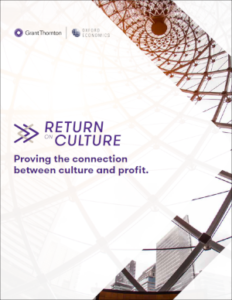Recent Release | 02 Apr 2019
Return on Culture: Proving the connection between culture and profit

Thought Leadership and Economic Consulting Teams
Oxford Economics


Assigning a measurable value to something as intangible and fluid as organisational culture – defined here as the often-unspoken rules that guide the behaviour of leaders and employees alike – is a challenge for even the best-managed companies. To address this quantification gap, Oxford Economics worked with Grant Thornton to create an economic model that tracks how particular aspects of culture map to key performance indicators. This work was based upon a cross-industry survey of 500 executives and 500 employees in the United States.
Our study shows that organisational culture is more than a nice-to-have employee perk – it’s critical to business performance, influencing outcomes in collaboration, customer satisfaction, and engagement and retention – and, ultimately, financial performance.
Read the Return on Culture: Proving the connection between culture and profit report
Visit the interactive website for the report
Our economic consulting and thought leadership teams are world leaders in quantitative economic analysis and original, evidence-based research, working with clients around the globe and across sectors to build models, forecast markets, run extensive surveys, and evaluate interventions using state-of-the art techniques.
Related Services

Post
KPMG M&A Outlook 2026: Between Uncertainty, Resilience, and Seizing Opportunities
Discover how Germany’s M&A landscape is evolving – with a focus on growth, AI and post-merger value creation.
Find Out More
Post
Silver, the next generation metal
This report highlights the critical role silver plays in data centres and artificial intelligence (AI), automotive and electric vehicles (EVs), and solar energy photovoltaics (PVs). With these sectors expected to expand significantly over the coming years, we expect future silver demand to be strong.
Find Out More
Post
Powering the UK Data Boom: The Nuclear Solution to the UK’s Data Centre Energy Crunch
The UK’s data centre sector is expanding rapidly as digitalisation, cloud computing, and artificial intelligence (AI) drive surging demand for high-performance computing infrastructure.
Find Out More